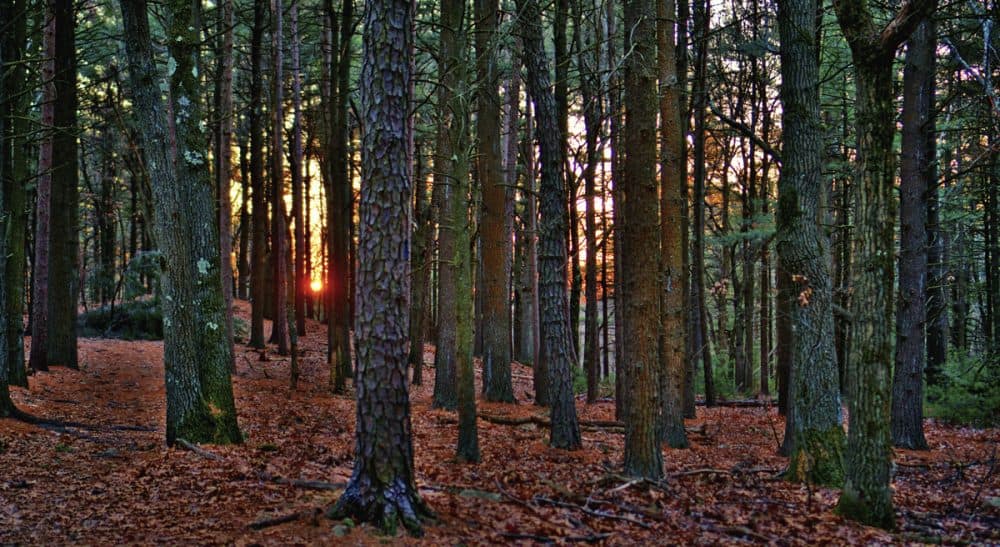Advertisement
Some Thoughts On The Nature Of Property

Whose woods these are I think I know.
On paper, at least, they have belonged to me for nearly 30 years. I've traipsed the extensive acreage so thoroughly by now that it's impossible to get lost for more than five or ten minutes, no matter how blindly I set off slashing through the underbrush. A landmark always looms, or opens up underfoot.
But others have disagreed. The goshawk in breeding season who stooped on me for walking too close to its nest and lingering too long in spite of its warning kree-kree, who left me with a scalp raked bloody by its talons and a bruised shoulder where it slammed full speed, knocking me to the ground as I was running away, had a different idea about whose woods these are.
These are New England woods, after all... Once they were open pasture; and even now fragmented stone walls, like disconnected strands of DNA, memorialize old genealogies, old ownerships.
The flatlander hunter who demanded "What are you doing here?" in a surly tone one fall morning when I was out for a stroll along my own trails also disagreed, but with less logic and legality on his side than the goshawk had.
Every turn is a reminder that I am not the master of this landscape. A fallen beech has rerouted a trail I cut carefully and have maintained for decades. To make it mine again, I will have to lug a chainsaw into the woods and reassert a growling stewardship. Along the way, hemlock branches and young poplars reach toward the sun I've made available by my own grooming, repossessing the laboriously hacked-out open ways. And even these I cut by following others' deeds: the tracks already laid down by deer and coyotes, and the traces of old lumber trucks from time well out of mind.
These are New England woods, after all, far from the forest primeval of a Longfellow romance. They reach from a vernal pond down to the old railroad bed, bounded by nature, industry and abandonment. Once they were open pasture; and even now fragmented stone walls, like disconnected strands of DNA, memorialize old genealogies, old ownerships. The timber has been harvested more than once — the hill it grows on is named after the proprietor of an 18th-century sawmill, the remains of which can still be seen next to a disused, crumbling mill dam a half mile away.
Advertisement
I have traced a paper-trail of deeds back to the son of a Revolutionary War hero who died at The Old North Bridge in Concord. Luckily, I suppose, for a colonial conscience, it doesn't seem to have been a land much favored for First Nation settlement, although undoubtedly bands of hunters passed through. Even so, the Abenakis had a more generous idea of property before property was wrested from them.
And, of course, long before that, this land was the bedrock under a glacier, which scattered megalithic mementos of its coming and going, as distinctive in their own way as the more recent moose droppings and fisher scat.
Now cometh the Owner in Title. I could show you where an immense boulder balances on another wondrously odd, draped in rock tripe. I call it Fox Perch, after the companion in whose company I first found it. Naming is a kind of ownership. But perhaps Fox Perch had another name once, a puff of air as insubstantial as the rock itself is solid.
As I grow older, the property reasserts its rights in the Court of Nature more and more strongly every year, and I riposte with my own chainsaw writs and clipper affidavits more and more weakly.
In her time, my daughter discovered one of the clusters of glacial erratics and turned it into a castle, carpeting the flat tops of the rocks with moss, caulking chinks in the stone with mud, stripping saplings to make ladders that could be drawn up to defend an impregnable fortress. All this has long since crumbled, and it would take a sharp archaeologist's eye to identify the ruin.
As I grow older, the property reasserts its rights in the Court of Nature more and more strongly every year, and I riposte with my own chainsaw writs and clipper affidavits more and more weakly. There is nothing distinctive about this acreage to make it valuable for its own sake to a conservation society, no endangered newt scuttles to precarious safety and no exotic wildflower born to waste its sweetness on the desert air. It's just woods. Or, if you choose to think of it another way, land too impractical to develop.
The day will come when I will no longer be able to look deeper than the first rank of trees; and then days further along when I will be confined to a room out of sight of this property defined by a county map, and then to an even smaller patch of earth.
Mine. All mine.
